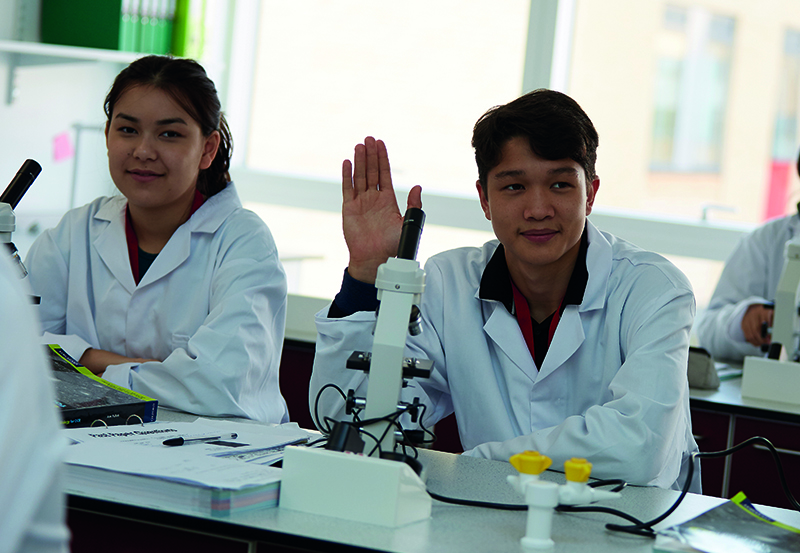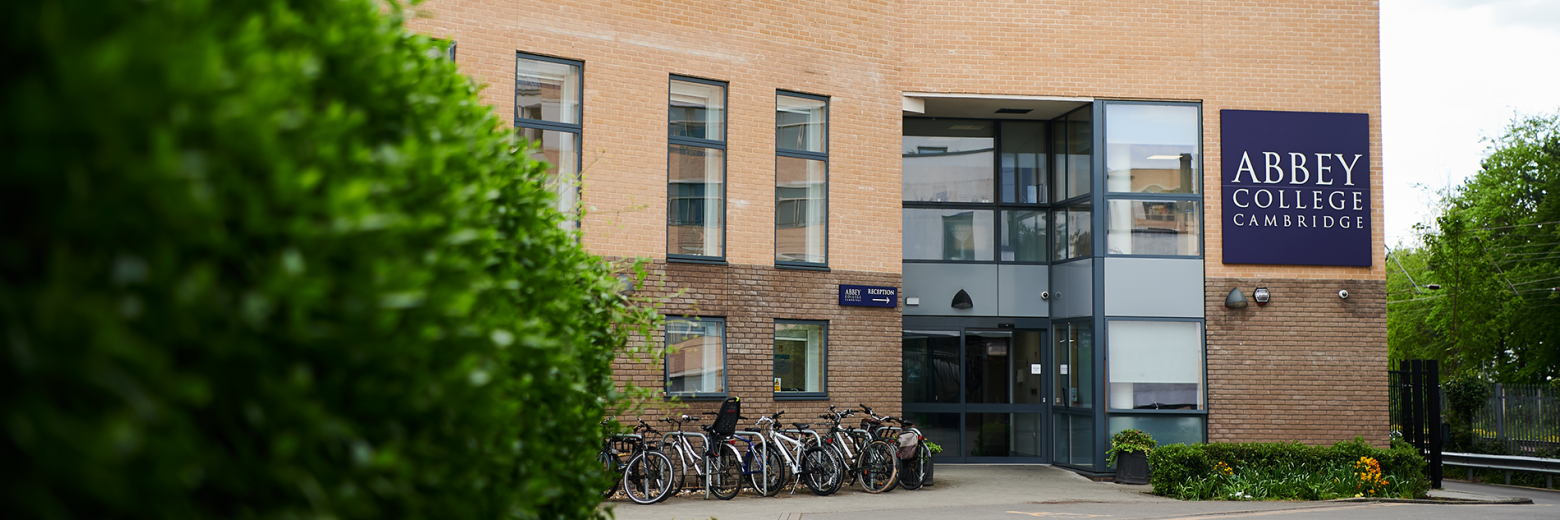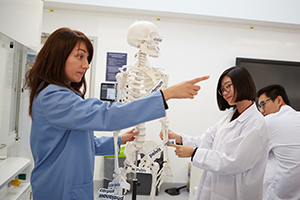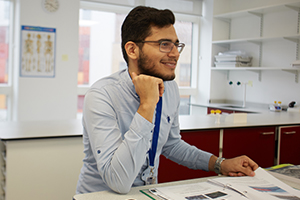Want to study Medicine at University? Here are 5 top tips for international students considering applying to medical school
22nd July 20

Securing a place to study medicine at a UK university is tough, high demand and limited places means that competition for places at UK medical schools is fierce, and it’s even tougher to get a place to study medicine if you are an international student.
Here at Abbey College Cambridge, we are experts at helping international students to secure a place to study medicine. In recent years we have helped more than 80 students progress to medical schools, with a very high acceptance success rate every year. In 2021 for example, 90% of our medicine applicants were successful in gaining a place at medical schools both in the UK and abroad.
A Levels are the most common course taken by students looking to study medicine, so here are five tips that will help if you are currently studying, or hoping to study A Levels and to progress on to study medicine in the United Kingdom.
1. Consider your A Level subject choice carefully
The A Level subject combination that you choose will determine the university courses that you can apply to. This is true for all UK undergraduate courses, and if you want to study medicine, the choice of qualifying A Level subjects you will be able to take is quite narrow, which could be good or bad news depending on your academic strengths.
The key A Level subjects for medicine students are mathematics, chemistry and biology. Some medical schools might ask for all three subjects, some might ask for chemistry or biology, all will ask for mathematics. Remember that medicine is probably the most competitive course for international applicants, so universities will be asking for strong A Level grades, most likely three A grades, and at the very minimum two A’s and a B.
This means it is important to be honest with yourself when considering medicine, if you haven’t been hitting high grades in maths and science subjects in your current studies, then how likely is it that you will be able to improve enough to achieve the grades you need? And also to cope with the challenge of a science heavy undergraduate course?
2. Read, Read, Read!
Modern medicine is an incredibly complex interdisciplinary profession that is constantly evolving. If you’re expecting to ace your A Level exams and then walk into a medical course without learning about life as a doctor, then you are in for a shock!
So one of the most important things you can do to improve your chances of studying medicine is to start learning about prectising medicine and what your life will be like as a doctor as soon as possible. This is why we provide all new Abbey College Cambridge students with a comprehensive medicine reading list before they join us.
Read as widely as possible, medicine has thousands of different fields and areas of specialisation. No-one will expect you to be an expert in all of them, but they will expect you to have a good understanding of both the breadth of medical practice and the latest discoveries and developments in medicine. This is why our Abbey College Cambridge medicine reading list contains a wide range of materials that includes medical research papers, journal articles, factual popular science books, biographies and autobiographies of medical professionals and news articles.
An important point to remember, no one expects you to have read every book about medicine (or indeed every book on our reading list!) from cover to cover. It’s much more practical to read little and often from a wide range of sources, this builds up you medicine general knowledge, and when you find a topic that particularly interests you then you can research it in more depth. At Abbey Cambridge we structure reading our medicine preparation programme to ensure that students have a wide range of knowledge in the key areas required by UK medical schools.
3. Get Medicine-related work experience
Working as doctor is incredibly rewarding, but it can also be a highly stressful and emotionally exhausting career. By their nature medical schools need to create high-pressure, challenging environments to ensure that would-be doctors have the resilience and determination to succeed and to be able to provide effective diagnosis and care.
So to secure a place at medical school you need to be able to demonstrate that you understand and are prepared for the challenges of life as a doctor. The best way to do this is to experience that life first hand through work experience.
Work experience is a vital component for successful entry to medicine. At Abbey Cambridge we help organise placements at local and national hospitals, but if you are an international student it also pays to gain some work experience in your home country before you join us and during school holidays.
Work experience can include shadowing a doctor or undertaking paid or voluntary work in a hospital or other healthcare setting such as a hospice or care home. If you are planning to study in the UK, whether this year, or in two or three years’ time, it is never too early to start gaining medical experience, even if that means just speaking to a doctor or a nurse about their experiences, or taking a first aid course.
4. Learn about the NHS
The National Health Service (NHS) is the UK’s healthcare system, if you study medicine in the UK, part of your studies will involve working as a junior doctor in the NHS. So it is vital that you have a clear understanding of what the NHS is, how it works, and how it differs from the healthcare system in your home country.
The good news is that you can find out lots about the NHS online and on UK news websites and through video sharing sites such as YouTube. Remember that as a doctor it is important to be able to think in analytical manner, so think about the problems the NHS faces alongside its benefits and compare that to your experience of healthcare at home – you will probably be asked about this in your medical school interview!
5. Develop your transferable skills
Some of the skills and qualities you will need to succeed in medicine, such as science and maths knowledge, the ability to think clearly and make decisions under pressure, are pretty clear and obvious. But it also pays to start thinking about and trying to develop some of the other skills doctors need.
These skills and qualities are many and varied, but could include problem solving, the stamina and physical fitness to work long hours, leadership and time management skills. But one of the most important skills that doctors need to develop are good communication skills.
Communication skills for doctors can perhaps be best summarised by a term we use in the United Kingdom called ‘bedside manner’. When we talk about bedside manner we mean that the doctor has to be able to show empathy with patients, but also to be assertive, to deliver complex information in ways that patients can understand, and often to deliver bad news.
Developing the emotional intelligence, confidence, and experience to be an effective doctor takes years of practice, but there are things you can do to help develop these qualities. Some example of activities you could try to help develop these qualities could be joining a drama or debating club or mentoring others. At Abbey College Cambridge we offer more than 60 weekly extra-curricular clubs designed to help build useful transferable skills, and we actively encourage our prospective doctors to join as many as possible.
These tips are by no means an extensive list of the things you need to do to prepare for medical school, but we hope that you have found them a useful starting point on your journey to medicine. At Abbey College Cambridge we offer an extensive preparation programme for medicine that students take alongside their A-Level studies to help develop that medical knowledge and practical skills needed for successful application to medical school.
If you would like to find out more please contact us.







